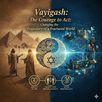Go Forth: A Tribute to a Life of Purpose and Vision
- Rabbi Yosef Vogel

- Oct 31, 2025
- 3 min read

Tomorrow marks the first anniversary of the passing of my father, Rabbi Faivish Vogel, of blessed memory. It is therefore most fitting to draw inspiration from this week’s Torah portion — especially as it was during this very week, back in 1960, that he began his lifelong journey as the Rebbe’s emissary.
As one embarks on a journey, it is vital to know the destination. That is why the beginning of the Jewish story, as told in this week’s Torah portion, is so puzzling. G-d says to Abraham: “Go forth from your land, from your birthplace, and from your father’s house, to the land that I will show you” (Genesis 12:1).
No destination is specified, no map is given — only a call to take a journey.
Surely this first verse — the very first words ever spoken by G-d to the first Jew — encapsulates the mission and purpose of every Jew.
Born in Manchester, England, in 1936, his formative years were shaped by the turbulence of the Second World War — enduring the nightly air raids by the German Luftwaffe during the Battle of Britain. After attending Manchester Grammar School, he enrolled in a Lithuanian-influenced yeshiva, dedicating his life to the study of Torah and Talmud.
Yet his soul yearned for something deeper. In the aftermath of the Holocaust, as world Jewry struggled to rebuild from the ashes, he sensed that the moment called for something of an entirely different order and magnitude - not only the preservation of tradition, but the rekindling of Jewish spirit on a global scale.
He reached out as a teenager to the Rebbe for guidance in the study of Chassidic teachings, before eventually embarking on a one-way boat journey from Southampton to New York in 1958 to be in close proximity to the Rebbe.
My father’s life story, and his profound impact on British Jewry, was defined by his willingness to leave his comfort zone and his constant challenge to others to do the same.
At every turn, inspired by the Rebbe, he disrupted Anglo Jewry’s conventional British thinking. In spearheading the purpose built Chabad Lubavitch house, he informed the Rebbe that sufficient funds weren’t available. The Rebbe replied simply: “It’s no great feat to build with money - build without money.” (The full mortgage was eventually paid in full).
One of those students was a young Jonathan Sacks, with whom he studied the Rebbe’s teachings — lessons that Rabbi Sacks later elucidated, edited, and published in his first book, Torah Studies. Years later, Rabbi Sacks, of blessed memory, wrote to my father:
“Thinking about it reminded me of the early days long ago and of everything that you and Shmuel [Rabbi Shmuel Lew] meant to me at that point when I could have shot off in who knows what direction. If I haven’t said so before: thanks for everything.”
He was never afraid to reach out to even the most assimilated members of British Jewry, enlisting their support for a wide range of initiatives. In a letter from Sir Isaiah Berlin to his cousin, the famed violinist Yehudi Menuhin, the two discuss how to respond to a request from my father — inviting Mr Menuhin to play the violin at a Chabad benefit dinner.
My father’s journey through life was inspired by that first verse to Abraham. There was never a clearly defined destination — only a continuous, determined effort to challenge himself and others to step beyond their comfort zones, ever striving to move one step closer to the Promised Land.




I came across your post Go Forth A Tribute to a Life of Purpose and Vision and found it truly inspiring how you reflect on purpose, growth, and the ripple effect of one meaningful life. It made me think about those moments when an online advanced mathematics class seems daunting and the idea of seeking some extra help comes to mind not to skip the work, but to regain clarity and keep moving toward that vision of growth you describe.